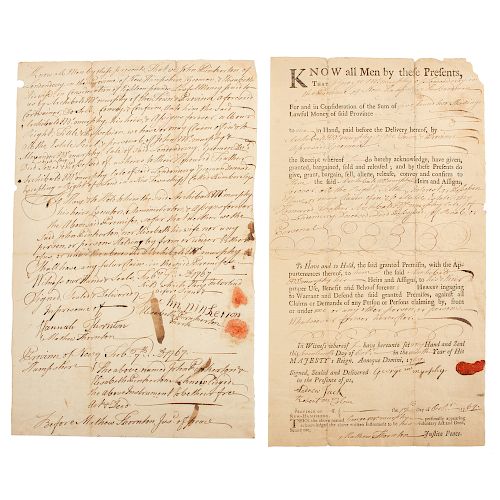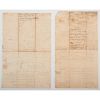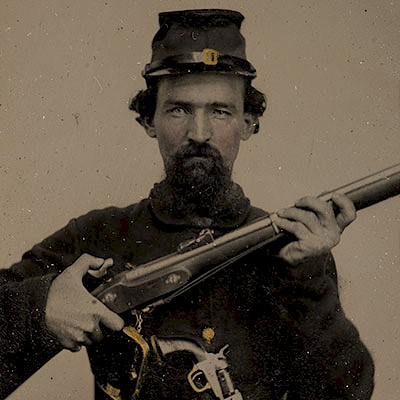Matthew Thornton, Signer of the Declaration of Independence, Lot of Two Signed Documents Including 1767 ADS and 1769 Partially Printed DS
About Seller
6270 Este Ave.
Cincinnati , OH 45232
United States
With offices in Cincinnati, Cleveland and Denver, Cowan’s holds over 40 auctions each year, with annual sales exceeding $16M. We reach buyers around the globe, and take pride in our reputation for integrity, customer service and great results. A full-service house, Cowan’s Auctions specializes in Am...Read more
Two ways to bid:
- Leave a max absentee bid and the platform will bid on your behalf up to your maximum bid during the live auction.
- Bid live during the auction and your bids will be submitted real-time to the auctioneer.
Bid Increments
| Price | Bid Increment |
|---|---|
| $0 | $25 |
| $500 | $50 |
| $1,000 | $100 |
| $2,000 | $250 |
| $5,000 | $500 |
| $10,000 | $1,000 |
| $20,000 | $2,500 |
| $50,000 | $5,000 |
| $100,000 | $10,000 |
About Auction
Jun 21, 2019
On June 21, Cowan’s Auctions will be offering a remarkable selection of historic photography, letters, documents, flags, political ephemera, and more representing the Revolutionary War-period through the Civil War, Indian Wars, and beyond, as well as the American West. Cowan's Auctions dawnie@cowans.com
- Lot Description
Thornton, Matthew (1714-1803). Signer of the Declaration of Independence as Continental Congress Delegate from New Hampshire. ADS as Justice of the Peace, " Mathew Thornton ," 1p, 7.5 x 12 in., " Province of New- / Hampshire ." February 7, 1767. Document records the receipt of " Eighteen pounds ," from the late Archibald McMurphy to John and Elizabeth Pinkerton of Londonderry, for which they release their rights to the estates of the late John and Alexander McMurphy, except for " a Right of Land in a New Township Called Number Six. " Document includes signatures of John and Elizabeth Pinkerton, and Hannah and Matthew Thornton, along with the remains of two red wax seals.
Partially printed DS as Justice of the Peace, " Mathew Thornton ," 1p, 6.75 x 12.25 in., " Province of New-Hampshire. " October 17, 1769. Document records the receipt of " five pound two Shillings ," from the estate of the late Archibald McMurphy to (his son) George McMurphy of Londonderry, for which George McMurphy releases his rights to his father's estate. Document includes George McMurphy's signature and partial red wax seal at lower right, with Thornton's signature at bottom.
Though originally from Limerick, Ireland, Matthew Thornton solidified his role in United States history by becoming one of only three delegates from New Hampshire to sign the Declaration of Independence. Having immigrated to North America as a small child, Thornton did not become immediately involved in the politics of the region. As he grew up, he set his sights on becoming a doctor, and opened his own practice in Londonderry, New Hampshire in 1740. He served as surgeon to the New Hampshire troops in the 1945 Siege of Louisbourg, during what became known as King George's War. Thereafter, Thornton held royal commissions as justice of the peace and colonel of militia, and was elected to represent Londonderry in the New Hampshire Legislature in 1758.
As colonial tensions heated up, so too did Thornton's political involvement. He was elected to the New Hampshire Provisional Congress in 1775, serving as that body's president and as chairman of the committee of safety. Thornton also helped make New Hampshire the first colony to design a government independent of Britain by drafting what would become the first state constitution. Thornton was elected to the Continental Congress in September 1776, and though he arrived in Philadelphia nearly three months after the formal signing of the Declaration of Independence, he was allowed to sign the document on behalf of New Hampshire. While this act became Thornton's most enduring legacy, he continued contributing to the political development of New Hampshire and the nascent nation in numerous capacities, including as judge of the superior court of New Hampshire from 1776-1782. After enjoying more than a decade of retirement from politics in Merrimack, New Hampshire, Thornton died in 1803 at the age of 89.Both documents with creasing, discoloration, brittle edges, and with some loss to edges and some separation at certain creases. 1767 document with two partial circular holes to upper left edge, and red ink inscription on verso reading, "copied / 12-13-1893." 1769 document with particular loss to upper right corner/edges.Condition
- Shipping Info
-
Buyers are required to pay for all packing, shipping and insurance charges. Overseas duty charges are the responsibility of the successful Bidder. Be aware that for larger and/or valuable items, shipping charges can be substantial. - If there is no shipping amount on listed your invoice, you will need to make arrangements to pick up or ship your purchase through an alternative shipping company. Our shipping department can be contacted at 513.871.1670 (ext. 219) or email shipping@cowans.com. - Shipping charges include insurance for your order while in transit. If you have private insurance we will adjust your charge to include only packing and shipping. - Please allow 14 – 21 days after payment to package and ship your purchase as carefully as possible.
-
- Buyer's Premium



 EUR
EUR CAD
CAD AUD
AUD GBP
GBP MXN
MXN HKD
HKD CNY
CNY MYR
MYR SEK
SEK SGD
SGD CHF
CHF THB
THB












